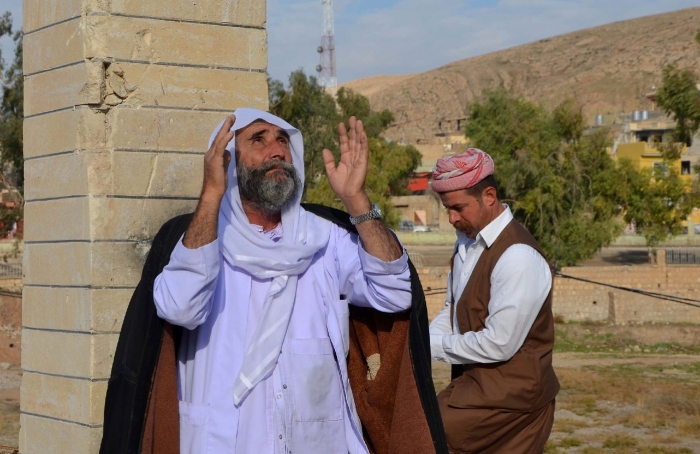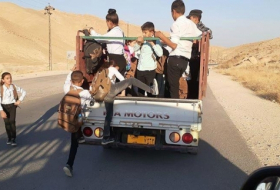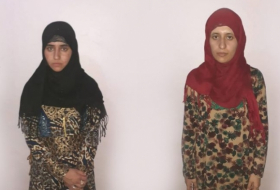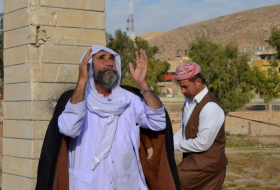How the Yazidis influenced Arab civilization

The mutual influence of ancient peoples and cultures in the middle East is a well-known fact. Unfortunately, nationalists of some Nations, including those with an ancient and unique culture allow extremes, they completely deny the influence on this culture of peoples of other ethnic origin. And on the contrary strongly attributed to common traits of their culture with the cultures of other Nations, borrowing from "yourself the great."
No one is going to deny the antiquity and uniqueness of Arab culture and civilization, as well as its enormous importance for all mankind. But when it comes to the common features in the traditional religions of the Arab population of Syria and Iraq (both Muslims and Christians) and Yezidis, as a rule, the emphasis is on the fact that it is the Yezidis who borrowed a lot from the Arabs, and not Vice versa.
Since there are dozens of Arab States in the world, and the Yazidis do not have their own state, but even full autonomy, few people know about the influence of the Yazidis on the cultures and civilizations of other peoples of the East, including the Arab one. With the exception of those areas of Iraq where Yazidis and Arabs live nearby.
In Iraq, especially in Mosul, the influence of Yazidis culture on the culture of the Arab population living nearby is a well-known fact. Otherwise, it is impossible to explain the existence of "intermediate" ethno-religious groups between the Yezidis and the Arab and Turkic population living in the same places. To which, above all, belong the Shabaks.
The emergence of the Shabaks as an ethno-religious group can be explained by the cultural wagging of the Yazidis as an ancient and unique civilization on the culture and worldview of the surrounding Arab and Turkic population.
As you know, Yazid can not be, they can only be born. The Yezidis preserved the purity of blood for thousands of years without mixing with other Nations. But at the same time the Yazidis have never had arrogant or disdainful attitude towards people of other nationalities and religions.
The antiquity and uniqueness of the Yazidi religion and culture are such that it has always attracted people of non-Yazidi origin who do not become Yazidis and do not mix with them, however, learned a lot from the religion of Yazidis and their culture. Those were the Shabak.
At present, the Shabaks constitute a significant part of the population of the Nineveh plain (whose population is largely Arabic-speaking), live in 35 villages, as well as in Mosul. Evidence of Shabaks in the region has existed since the 16th century and their religious beliefs contain mainly Sunni, Shiite, and some Christian elements.
Sabaki maintain close ties with the community of Yezidis and many make the pilgrimage to the Holy places of the Yazidis. They also have a Holy book called "Byruk", which is written in Turkmen. The census data are not recognized as Shabak, as previous arabization campaigns conducted by Saddam Hussein's regime did not allow them to be recognized officially.
Some scientists connect the origin of the Shabaks with the Iranian Kurdistan, others are inclined to think that the Shabaks are descendants of Turkmens, immigrants from Anatolia. But there is an opinion of serious scientists-Orientalists that the Shabaks originally had not Yezidi and not Turkic, and Semitic (Arab) origin.
Although almost nothing is known about Shabaks from ancient historical sources, their origin can be attributed to ancient times, possibly pre-Islamic and pre-Christian, when the Yazidis already existed as a separate people and lived on their ancestral land – in Northern Mesopotamia.
The fact that in ancient Northern Mesopotamia people believed in One God actually says the Bible. In particular, in Northern Mesopotamia at that time lived Abraham (who moved from the South Mesopotamia – from the ancient Sumerian city of Ur in what we see the relationship of the Yezidi civilization Sumerian). It was here that Abraham buried his father Farrah.
Living in Northern Mesopotamia, the historical homeland of the Yazidis, representatives of the Semitic peoples, including those who later became part of the United Arab people, also apparently under the influence of the Yazidis came to believe in One God. And it is no coincidence that later in the Arab Caliphate cultural centers very quickly moved from Arabia, from the areas of Medina, Mecca and Yemen to the North, Syria and Iraq. So the emergence of "intermediate" ethnic and religious groups between the Yazidis on the one hand, the Arabs and other peoples of the East on the other, historical regularity.
At present, "nationality" the same Kabakov is a struggle. The authorities of Iraqi Kurdistan seek to record them in the "Kurds". The authorities in Baghdad insist on their Arab origin. But in any case, the fact that the Shabaks are not Yazidis worship Yazidis shrines speaks of the enormous cultural and spiritual influence that Yazidis had on other Nations. And the Shabaks are most likely a consequence of such influence of the Yazidis on people, according to scientists, mostly belonging to the same Arab civilization. And this influence has yet to be seriously studied.
Ezdin Safari
Tags: #yazidisinfo #yezidi #yazidi #newsofyezidi









